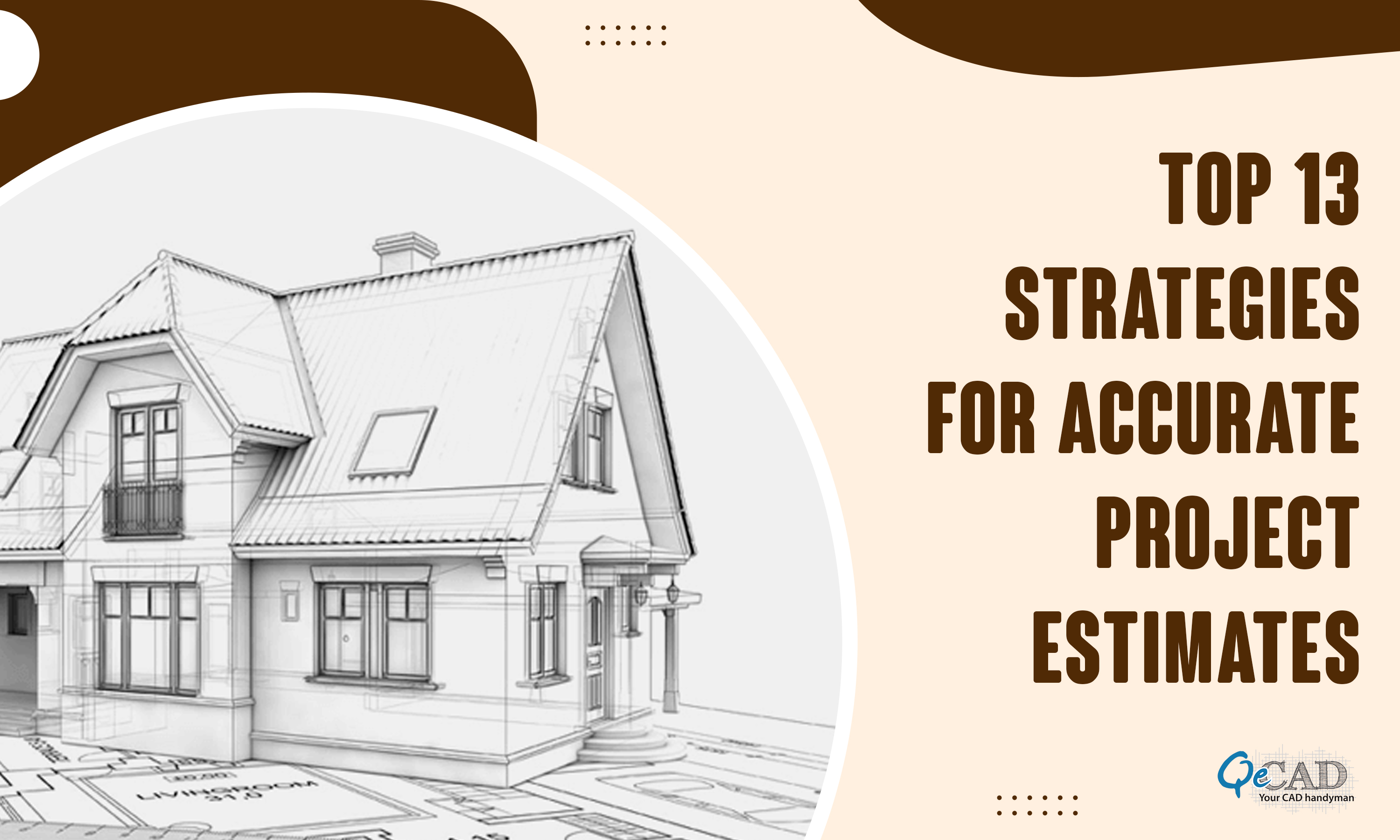
Introduction
Accurate project estimates are the cornerstone of successful construction projects for any Drafting Company. Accurate estimates help in managing costs, avoiding overruns, and ensuring that a project stays within its budget. However, achieving precise estimates in the construction industry can be challenging due to the various variables and uncertainties involved. In this blog, we’ll evaluate some key tips to help improve the accuracy of your building project estimates.
1) Comprehensive Site Evaluation
One of the fundamental steps in creating accurate estimates is conducting a comprehensive site evaluation. This includes a thorough analysis of the land, its geological and environmental conditions, and any potential hazards. The site’s conditions can greatly impact construction costs and timelines. Overlooking or underestimating these factors can lead to costly surprises down the line.
2) Detailed Project Scope
A detailed project scope is essential for accurate estimates. A well-defined scope document should include specifics such as architectural plans, engineering drawings, materials specifications, and a clear understanding of the project’s purpose and objectives. The more comprehensive your project scope, the more accurate your estimates will be.
3) Historical Data and Benchmarking
Leverage historical data from past projects and industry benchmarks. Historical data provides valuable insights into the cost and time considerations of similar projects. Benchmarking against industry standards can help you identify potential discrepancies in your estimates and refine your projections accordingly.
4) Collaborative Approach
Construction projects are often a collaborative effort, involving various stakeholders. Involving key team members, including architects, engineers, contractors, and subcontractors, from the early stages can help gather different perspectives and insights that contribute to more accurate estimates. Collaboration encourages the identification of potential issues and innovative cost-saving solutions.
5) 4D BIM Services for Enhanced Visualization
Integrating 4D BIM Services into your estimating process can significantly improve accuracy. 4D BIM adds a time dimension to the traditional 3D models, allowing you to visualize the entire construction process. This technology provides a dynamic representation of how a project will evolve over time, helping you identify potential clashes, sequencing issues, and resource allocation problems.
4D BIM services enable you to create a visual project schedule that can be linked to your cost estimates. This allows you to assess the impact of changes in the schedule on project costs, leading to more accurate and dynamic estimates. The ability to see the project’s evolution in a 4D model helps in identifying potential inefficiencies and optimizing the construction process.
6) Risk Assessment
Identifying and assessing potential risks is crucial for accurate estimates. Construction projects carry inherent risks stemming from variables such as inclement weather, evolving regulations, unexpected site conditions, and labor-related challenges. Incorporating a risk assessment into your estimate can help create a contingency plan and set aside funds for unexpected events, reducing the chances of cost overruns.
7) Up-to-Date Cost Data
Construction costs are continually changing due to factors like inflation, market fluctuations, and material availability. To improve accuracy, use up-to-date cost data and pricing information. Relying on outdated figures can lead to underestimating the actual costs of materials and labor, potentially causing budget overruns.
8) Accurate Quantity Take-offs
Quantity take-offs involve calculating the exact quantities of materials, labor, and other resources for a project. Utilizing computer-aided design (CAD) software and construction estimating software can help ensure precise and consistent take-offs. Accuracy in quantity take-offs directly influences the accuracy of cost estimates.
9) Multiple Estimate Iterations
Creating a single estimate can lead to errors and omissions. To enhance accuracy, consider developing multiple iterations of your estimate. Reviewing and refining the estimate several times can help catch overlooked items or discrepancies and ultimately result in a more precise estimate.
10) Technology Integration
Embrace technology in the estimation process. Contemporary software and tools tailored for construction estimation, scheduling, and project management have the potential to enhance precision exponentially. These tools can automate calculations, facilitate data sharing among team members, and streamline the overall estimation process.
11) Regular Updates and Revisions
Construction projects are dynamic, with circumstances subject to change over time. It’s essential to regularly update and revise your estimates to account for any modifications or unforeseen developments. A well-maintained estimate ensures that you are working with the most accurate and current data throughout the project’s lifecycle.
12) Professional Development
Invest in ongoing training and professional development for your estimating team. Staying current with industry best practices and learning how to use the latest estimating software can improve the skillset of your estimators, leading to more accurate estimates.
13) Transparent Communication
Effective communication among all project stakeholders is key to accuracy. Keeping the client, contractors, and team members informed about the estimating process and any changes or adjustments is essential for maintaining trust and ensuring that everyone is on the same page regarding project costs.
Conclusion
Precise building project estimates are a fundamental requirement for the success of every construction endeavor. Implementing these tips, along with integrating 4D BIM services, can help you improve the accuracy of your estimates, narrow down the risk of cost overruns, and enhance the overall efficiency of your projects. By conducting thorough site evaluations, developing detailed project scopes, and leveraging technology and collaborative efforts, you can enhance your estimating process and increase your chances of delivering projects within budget and on time. Remember that accurate estimates not only benefit your bottom line but also contribute to client satisfaction and the overall success of your construction business.
